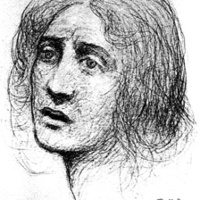Al-Khansa
Item
Author
Al-Khansa
Location
Najd, Saudi Arabia
Dates
d. 646
Biography
Al-Khansa' is celebrated as the first woman poet in Arabic and consistently upheld as an example of an accomplished and creative Arab, Muslim woman. Born in pre-Islamic Arabia, al-Khansa's composition of poetry is believed to have spanned the period of the coming of Islam, and she is often regarded as one of its earliest converts. She converted to Islam after meeting the Prophet Muhammad, and all of her children died fighting for the religion. Al-Khansa is a nickname, denoting a snubbed nose; her real name is Tumadir Bint 'Amir.
The deaths of two of her kinsmen—her brother Muʿāwiyah and her half-brother Ṣakhr, both of whom had been tribal heads and had been killed in tribal raids sometime before the advent of Islam—threw al-Khansāʾ into deep mourning. Her elegies on these deaths and that of her father made her the most celebrated poet of her time. When her tribe as a group accepted Islam, she went with them to Medina to meet the Prophet Muhammad, but she persisted in wearing the pre-Islamic mourning dress as an act of devotion to her brothers. When her four sons were slain in the Battle of Qādisīyah in 637, the caliph ʿUmar is said to have written her a letter congratulating her on their heroism and assigned her a pension.
The collected poetry of al-Khansāʾ, the Dīwān, reflects the pagan fatalism of the tribes of pre-Islamic Arabia. The poems are generally short and imbued with a strong and traditional sense of despair at the irretrievable loss of life. The elegies of al-Khansāʾ were highly influential, especially among later elegists.
Al-Khansa’s importance and resonance is not limited to esoteric or "high" literary circles in the Arab world that would demand a deep understanding of her copious poetic output. Indeed, in Arabic the name al-Khansa evokes a range of symbolic meanings linked not only to her poetry but also, more importantly, to her role as an exemplary Arab and Muslim woman: her name adorns schools and hospitals.
The deaths of two of her kinsmen—her brother Muʿāwiyah and her half-brother Ṣakhr, both of whom had been tribal heads and had been killed in tribal raids sometime before the advent of Islam—threw al-Khansāʾ into deep mourning. Her elegies on these deaths and that of her father made her the most celebrated poet of her time. When her tribe as a group accepted Islam, she went with them to Medina to meet the Prophet Muhammad, but she persisted in wearing the pre-Islamic mourning dress as an act of devotion to her brothers. When her four sons were slain in the Battle of Qādisīyah in 637, the caliph ʿUmar is said to have written her a letter congratulating her on their heroism and assigned her a pension.
The collected poetry of al-Khansāʾ, the Dīwān, reflects the pagan fatalism of the tribes of pre-Islamic Arabia. The poems are generally short and imbued with a strong and traditional sense of despair at the irretrievable loss of life. The elegies of al-Khansāʾ were highly influential, especially among later elegists.
Al-Khansa’s importance and resonance is not limited to esoteric or "high" literary circles in the Arab world that would demand a deep understanding of her copious poetic output. Indeed, in Arabic the name al-Khansa evokes a range of symbolic meanings linked not only to her poetry but also, more importantly, to her role as an exemplary Arab and Muslim woman: her name adorns schools and hospitals.
Works
Dīwān al-bākiyatayn: al-khansāʼ Laylá al-Akhyalīyah, Time is full of surprises,
The rising and setting of the sun keep turning on my memory of Sakhr's death,
Tears,
Sakhr,
Lament for A Brother,
My Sons,
The Leader of Horses Time Has Gnawed At Me,
O My Eyes,
I See Time,
On Her Brother Sakhr,
Sleepless I Kept the Night Vigil,
Could I Only Have Died of Sadness
The rising and setting of the sun keep turning on my memory of Sakhr's death,
Tears,
Sakhr,
Lament for A Brother,
My Sons,
The Leader of Horses Time Has Gnawed At Me,
O My Eyes,
I See Time,
On Her Brother Sakhr,
Sleepless I Kept the Night Vigil,
Could I Only Have Died of Sadness
Languages
Arabic
Genres
Lyrical, Elegaic, Courtly Panegyric
Bibliography
"Classical Poems by Arab Women: A Bilingual Anthology, edited by Abdullahal-Udhari, Saqi Books, 1999, London;
An Arab Woman Poet as a Crossover Artist? Reconsidering the Ambivalent Legacy of Al Khansaʾ Author(s): Michelle Hartman Source: Tulsa Studies in Women's Literature, Vol. 30, No. 1 (Spring 2011), pp. 15-36 Published by: University of Tulsa;
Islamic Art, Literature, and Culture by Britannica Educational Publishing;
Tradition, Modernity, and Postmodernity in Arabic Literature: Essays edited by Issa J. Boullata, Kamal Abdel-Malek, Wael B. Hallaq;
The Islamic Roots of the Poetic Syllogism Author(s): Tanyss Ludescher Source: College Literature, Vol. 23, No. 1, Comparative Poetics: Non-Western Traditions of Literary Theory (Feb., 1996), pp. 93-99 Published by: The Johns Hopkins University Press;
Music of a Distant Drum: Classical Arabic, Persian, Turkish, and Hebrew Poems;
An Arab Woman Poet as a Crossover Artist? Reconsidering the Ambivalent Legacy of Al Khansaʾ Author(s): Michelle Hartman Source: Tulsa Studies in Women's Literature, Vol. 30, No. 1 (Spring 2011), pp. 15-36 Published by: University of Tulsa;
Islamic Art, Literature, and Culture by Britannica Educational Publishing;
Tradition, Modernity, and Postmodernity in Arabic Literature: Essays edited by Issa J. Boullata, Kamal Abdel-Malek, Wael B. Hallaq;
The Islamic Roots of the Poetic Syllogism Author(s): Tanyss Ludescher Source: College Literature, Vol. 23, No. 1, Comparative Poetics: Non-Western Traditions of Literary Theory (Feb., 1996), pp. 93-99 Published by: The Johns Hopkins University Press;
Music of a Distant Drum: Classical Arabic, Persian, Turkish, and Hebrew Poems;
